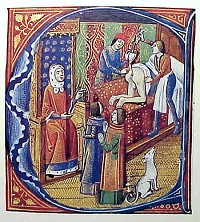Argan alone in his bedroom, seated at a table reckoning up his apothecary’s bills with counters, and talking to himself at follows Three and two make five, and five make ten and ten twenty. Three and two make five. Item, on the twenty-fourth, a small injection, preparatory, insinuative, and emollient to lubricate, loosen, and stimulate the gentleman’s bowels. That’s one thing I like about Mr Fleurant, my apothecary, his bills are so extraordinarily polite! The gentleman’s bowels—thirty sous! All the same, Mr Fleurant, politeness isn’t everything: you must be reasonable as well and not fleece your patients. Thirty sous for an injection? With all due respect, I’ve told you this before. You only charged me twenty in your previous bills and when an apothecary saps twenty it really means ten, so there we are, ten sous. Item, on the same day, a good detergent injection compounded of a double catholicon, rhubarb, mel rosatum, etc., according to prescription, to flush, irrigate, and thoroughly clean out the gentleman’s lower intestine; thirty sons. With your permission, ten. Item, the same evening, a hepatic, soporific, and somniferous julep to induce the gentleman to sleep, thirty-five soul. I’ve no complaint about that for it made me sleep well. Ten, fifteen, sixteen, seventeen, and a half sous. Item, on the twenty-fifth, a sound purgative and stimulating concoction of fresh cassia with Levantine senna as prescribed by Mr Purgon to expel and evacuate the gentleman’s bile, four francs. Oh! Mr Fleurant, you can’t mean that t you must give your patients a chance! Mr Purgon never told you to charge four francs. Make it three if you don’t mind and we’ll put down one and a half. Item, the same day, an astringent and soothing potion to help the gentleman to repose. Thirty sous—very well, put down ten, fifteen sous. Item, the twenty-sixth, a carminative injection to expel the gentleman’s wind, thirty soul; call it ten, Mr Fleurant. The same thing repeated in the evening, thirty sous. No, Mr Fleurant, call it ten. Item, the twenty-seventh, a powerful dose to disperse, dissipate, and dispel the gentleman’s ill humours, three francs. Right, twenty-thirty soul, I’m glad to see you so reasonable. Item, the twenty-eighth, a dose of clarified and dulcified whey, to purify, temper, tone up, and restore the gentleman’s blood, twenty soul; good, we’ll say ten. Item, a tonic compounded of twelve grains of bezoar, syrup of lemon and pomegranate, etc., according to prescription: five francs. Oh! Mr Fleurant, steady on, if you please! If you go on like that nobody will want to be ill any more. Be satisfied with four francs and we’ll put down twenty, forty sous. Three and two make five and five, ten, and ten make twenty. Total—silty-three francs, four and a half soul. That means that this month I’ve had one, two, three, four, five; six, seven, eight, lots of medicine and one, two, three, four, “five, six, seven, eight, nine, ten, eleven, twelve injections and last month I had twelve lots of medicine and twenty injections. I’m not surprised that I’m not as well this month as last. I muse have a word with Mr Purgon and get him to put that right. Come and take all this away somebody. There’s nobody there. It’s no use my talking: I’m always being left alone. There’s just no way of keeping them here. Kings a bell to summon servant They don’t hear. The bell doesn’t make enough noise. Ting a ling, a ling, a ling. No use. Ting a ling, a ling. They are all deaf. Toinettel Ting a ling, a ling, a ling. Just as if I’d never rung at all. You jade! You slut! Ting a ling. It’s infuriating. He rings no more but calls ting a ling a ling! The devil take her, the wretched creature! How can they possibly leave a poor sick man alone! Ting a ling, a ling! It’s pitiful! Ting a ling, a ling! Oh my God! They’ll leave me here to die! Ting a ling, a ling!
(Source: Molière: The Imaginary Invalid (Le Malade Imaginaire)—Acte I Scene 1 (origin: 1673) In The Misantroph and other plays. Translated with an Introduction by John Wood. (Penguin Classics.) Penguin Books, London, 1989. pp 211—212.)

